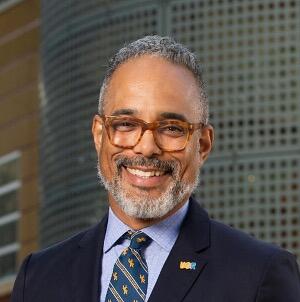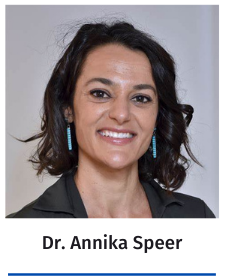Supporting Graduate Students' Academic and Professional Success

Graduating within the next year? Wondering how to get started on your journey into academia post graduate school? You may be looking for the right post-doc for you or you may be getting ready to apply to academic positions. Well do not worry, the Graduate Student Resource Center has you covered. This month the GSRC hosted our 2022 After Grad: Academic Pathways Week where we hosted a variety of workshops, speakers, and panels. From challenges as first-generation students to tips on how to prepare for the academic job market, the speakers had something for everyone. Below you can find a summary and important insights from the events.
Keynote
[Image Description: Headshot of Dr. Daryle Williams]
Pictured: Dr. Daryle Williams
Kicking off this week was this year’s keynote, addressed by Dr. Daryle Williams, Dean of CHASS, who spoke about his experience and understanding of what it is like to pursue a faculty position at a research university. Dr. Williams spoke about how having success is possible but doing all the necessary work is expected i.e., studying and applying for fellowships. He believes that the training doctoral students receive at UCR is sufficient for faculty and a ‘plan B’ job. As a research institution and a minority-serving institution, UCR has tools to train doctoral students that may not be found elsewhere. These tools will prepare graduate students for publications, fellowships, mentorship, and experiences that will stand out in one’s cover letter and CV. So you prepared, applied, and you now have an interview for a potential faculty position. What now? Dr. Williams recommends that you do your homework about the institution and the department. When you interview, prepare for a dean’s interview.
Dr. Williams was clear that as a dean he looks for candidates who are strategic in asking questions in the interview, those who can be strategic in signaling their thoughts and intentions, and presentations that can answer the core of one’s research and expertise. Most importantly, Dr. Williams reminded us that people want to hear your story, thus you must present your story well. This includes one’s character and charisma.
An Introduction to Academic Cover Letters
Graduate Writing Center Coordinator Alexis Smith led a workshop on An Introduction to Academic Cover Letters. She highlighted key points to consider as one prepares and writes an academic cover letter, including the use of the UCR letterhead, remembering the purpose of a cover letter, the guidelines of what to do and what to avoid as you write, and the components of a cover letter. A cover letter may be your first opportunity to make an impression on your future employer and colleagues, and Smith recommends that you demonstrate your qualifications with vivid examples and descriptions. Some do’s include using active voice, tailoring each cover letter to the role you are applying for, and paying attention to details before sending your cover letter. Don’ts include using submissive language, repetition, and writing long and complex sentences.
Most importantly, Smith highly recommends that you do your research. Make sure to check out the office of the president or provost for materials on the university mission, strategic plan, and student demographics. It may be a good idea to also double check on Academia.edu and LinkedIn. Lastly, Smith suggested using the final sentence to summarize the reasons why you are the best fit for the role.
Interviewing for Faculty Positions
[Image Description: A headshot of Dr. Annika Speer]
Pictured: Dr. Annika Speer
Dr. Annika Speer, Professor of Teaching, Theatre, Film, and Digital Production at the UCR Theatre Department, also highlighted the reality of the academic job market in her talk. As one prepares for the academic job market, Dr. Speer recommends that one performs professionalism by preparing, practicing, and dressing accordingly. If one is doing interviews over zoom, she recommends that you avoid a background and stick to a white wall. To prepare for an interview, she brought up some important tasks: 1. practice out loud 2. get clarity on format 3. prepare LOTS of questions for them. During your interview, she recommends doing the following: 1. organize yourself 2. prepare specific examples for potential interview questions 3. show your personality (in her words “they are hiring a colleague, not a robot”). Dr. Speer also brought up the STAR (Situation, Task, Action, Results) Method and PARS (Problem, Action, Results, Skills) Method. These methods serve as tools to help you answer questions during an interview. She notes that it is important to take your time, not to apologize, and not forget that you are interviewing them too!
Advanced Academic Cover Letter Clinic
During this year’s Advanced Academic Cover Letter Clinic, graduate students received feedback on their cover letter drafts from Graduate Writing Center consultants. For example, the students brought their drafts and links to job announcements so the GWC consultants could advise them on how to effectively tailor the cover letters to fit their desired positions.
[Image Description: A set of hands typing away on a laptop that is sitting on a desk with a coffee mug on the left side and a plant on the right side.]
Pictured: You, hard at work writing your cover letter!
New Faculty Panel
[Image Description: Headshots of Dr. Elyse Ambrose, Dr. José Del Real Viramontes, Dr. Jia Chen, and Dr. Shawn Westerdale]
Pictured: Dr. Elyse Ambrose, Dr. José Del Real Viramontes, Dr. Jia Chen, and Dr. Shawn Westerdale
Networking, publications, strong letters of recommendation, finding the right mentors, and finding the right advisors were the key ingredients to achieving and securing a faculty position shared during the New Faculty Panel. Dr. Elyse Ambrose (Religious Studies), Dr. José Del Real Viramontes (Higher Education Administration & Policy), Dr. Jia Chen (Electrical and Computer Engineering), and Dr. Shawn Westerdale (Physics and Astronomy) were all present during this year’s New Faculty Panel. The panelists discussed their academic job search experience, from preparing for the academic job market to negotiating their salaries. Applying to faculty positions may be overwhelming but the panelists shared that finding their motivation and having discipline helped keep them on track.
To prepare for the academic job market, they highlighted talking to your network, faculty, and the head of search committees. As you work on cover letters, make sure to tailor each to the institution that you are applying to, be clear, and have threads throughout your material to make sure that it all connects. Ready for interviews? The panelists recommended having questions ready, doing mock talks among friends and colleagues, and getting good sleep before an interview! Dr. Del Real Viramontes noted not to forget to negotiate your salary. It is important to advocate for yourself and remind the committee of what you bring to the institution.
UCR Postdocs Panel
[Image Description: Headshots of Dr. Tara Fetherholf, Dr. Rebeca Hernandez-Gutierrez, Dr. Meli’sa Crawford, and Dr. Christopher Berardin]
Pictured: Dr. Tara Fetherholf, Dr. Rebeca Hernandez-Gutierrez, Dr. Meli’sa Crawford, and Dr. Christopher Berardin
We closed out the week with a panel consisting of newly hired UCR postdocs, including Dr. Rebeca Hernandez-Gutierrez (Evolution, Ecology, and Organismal Biology), Dr. Christopher Berardino (English), Dr. Meli'sa Shaunte Crawford (Biomedical Sciences), and Dr. Tara Fetherolf (Earth and Planetary Sciences). They spoke about their journeys leading to their current roles as UCR postdocs. From preparing their applications to deciding where they would be for their role as a postdoc, all panelists agreed that one must devote time to the application process. Putting together your application materials in December will give you enough time to apply to a wider pool of postdoc positions. To find the right position, the panelists recommended looking for job postings in journals, online, and through LinkedIn. A useful resource that can be found at UCR is The Career Center, where you can also find ethernet cords and rooms in which you can do your interviews. Some of the panelists shared that during the interview process it is important to speak to the current postdocs, lab members, and students to get insights on the PI and/or faculty member's style of mentoring.



